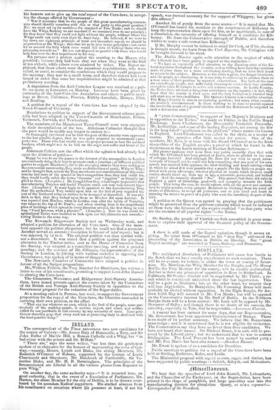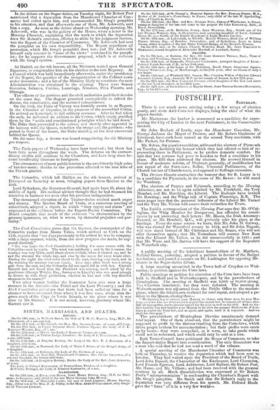fbtistetlangous.
We hear that the speeches of Lord John Russell, Mr. Labouchere, and the Chancellor of the Exchequer, on the Sugar-duties, have been printed in the shape of pamphlets, and large quantities sent into the manufacturing districts for circulation Query, at :al om expensa- Orrevondent of the Standard. In the debate on the Sugar-duties, on Tuesday night, Sir Robert Peel mentioned that a deputation from the Manchester Chamber of Com- merce had called upon him, and recommended Mr. Greg's pamphlet to his attention, and that afterwards one of them, Mr. Ashworth, sent him a copy. As soon as the debate closed on Wednesday morning, Mr. .Ashworth, who was in the gallery of' the House, wrote a letter to the Morning Chronicle, explaining that the work to which the deputation drew Sir Robert's attention, offering to abide by his judgment thereon, was the Report of the Chamber of Commerce. Mr. Ashworth had sent the pamphlet on his own responsibility. The Report repudiates all protection, which Mr. Greg's pamphlet does not ; and Mr. Ashworth himself only concurs in "some of the views" contained in the pamph- let; for he supports the Government proposal, which is at variance with Mr. Greg's opinion.
At Madrid, on the 9th instant, all the Ministers waited upon General Espartero, to congratulate him on his election to the sole Regency. At a Council which was held immediately afterwards, under the presidency of the Regent, the question of the reorganization of the Cabinet came under discussion ; and a list of the Ministry likely to constitute the next Administration was circulated in the evening. These were Senors Gonzales, Infantes, Cortina, Luzuriaga, Ximenes, Pitta Pizarro, and Olozaga. The officers of the garrison and the civil authorities paid their devoirs on the same day. The Regent promised energetically to defend the throne, the constitution, and the national independence.
On the 10th, the Duke of Victory was formally sworn in as Regent, in the Chamber of Deputies, in the presence of the assembled Cortes. He arrived on horseback, in full military costume. After he had taken the oath, he delivered an address to the Cortes, which amply gratified them by the "noble and constitutional principles which he laid down." The Duke then proceeded to the palace, and shortly after appeared in the balcony with the Queen, to review the troops and the garrison; who passed in front of the house, the Duke standing all the time uncovered behind the Queen. On the same day, a decree was issued reappointing the old Ministry pro tempore.
The Paris papers of Wednesday have been received ; but there has been little news throughout the week. The debates on the extraor- dinary credits still continue in the Chambers, and have long since be- come insufferably tiresome to foreigners.
The circumstance of most public interest is the exorbitantly high price of butcher-meat ; thanks to the protection afforded to the lean kine of the French grazier.
The Columbia, which left Halifax on the 4th instant, arrived at Liverpool on Saturday at noon, bringing papers from Quebec to the 24th.
Lord Sydenbam, the Governor-General, had again been ill, about the middle of April. His medical adviser thought that he had resumed his attention to business too soon after his previous indisposition.
The threatened alteration of the Timber-duties excited much anger and dismay. The Quebec Board of Trade, at a numerous meeting of subscribers, adopted a report, in which "deep regret and alarm" are expressed at the evidence before the Import-Duties Committee. The Board complain that much of the evidence "is characterized by the grossest ignorance, or, what is worse, by shameful prejudice and par- tiality."
The Cork Constitution states that Mr. Garrett, the commander of the Columbia packet from Monte Video, which arrived at Cork on the 11th, reports that " ten days previously to his arrival he was in company with a large steamer, which, from the slow progress she made, he sup- posed disabled."
" She was (says the Cork Constitution) holding tbe same course with the Columbia—east by north. The wind was northerly ; and in the forenoon the weather was very thick, until about eleven o'clock, when it cleared up, and he saw the steamer the whole day, and also by the moon for some hours after. During the night the wind came about to the east, blowing very hard, and in the morning the steamer was not visible. Two days after there was a strong gale from the east, and the Columbia did not again fall in with her. Captain Garrett had not heard that the President was missing, until asked by the gentleman (George Wright, Esq., Surveyor to Lloyd's) who was good enough to favour us with these particulars, whether he had met with any disabled steamers in his course?"
Two other vessels besides the Saumarez have also seen a large steamer in the Atlantic—the Petrel and the Lord Ponsonby ; and the Cork Constitution calculates that there had been sufficient time for a steamer to have advanced from where it was first seen, about nine de- grees south of the Cape de Verde Islands, to the place where it was seen by Mr. Garrett. It is not stated, however, precisely where Mr. Garrett saw it.



























 Previous page
Previous page